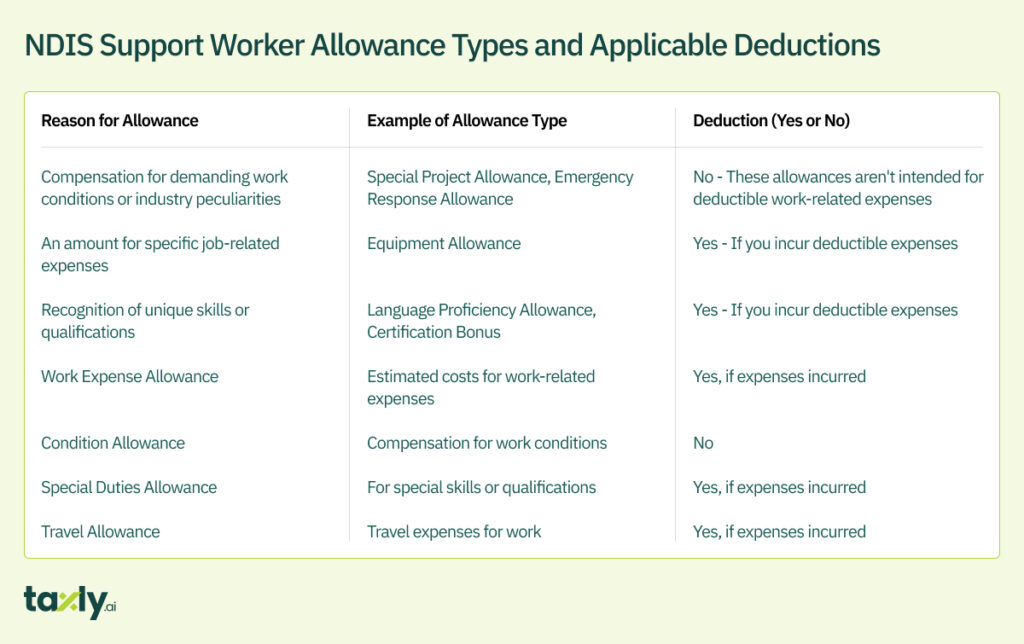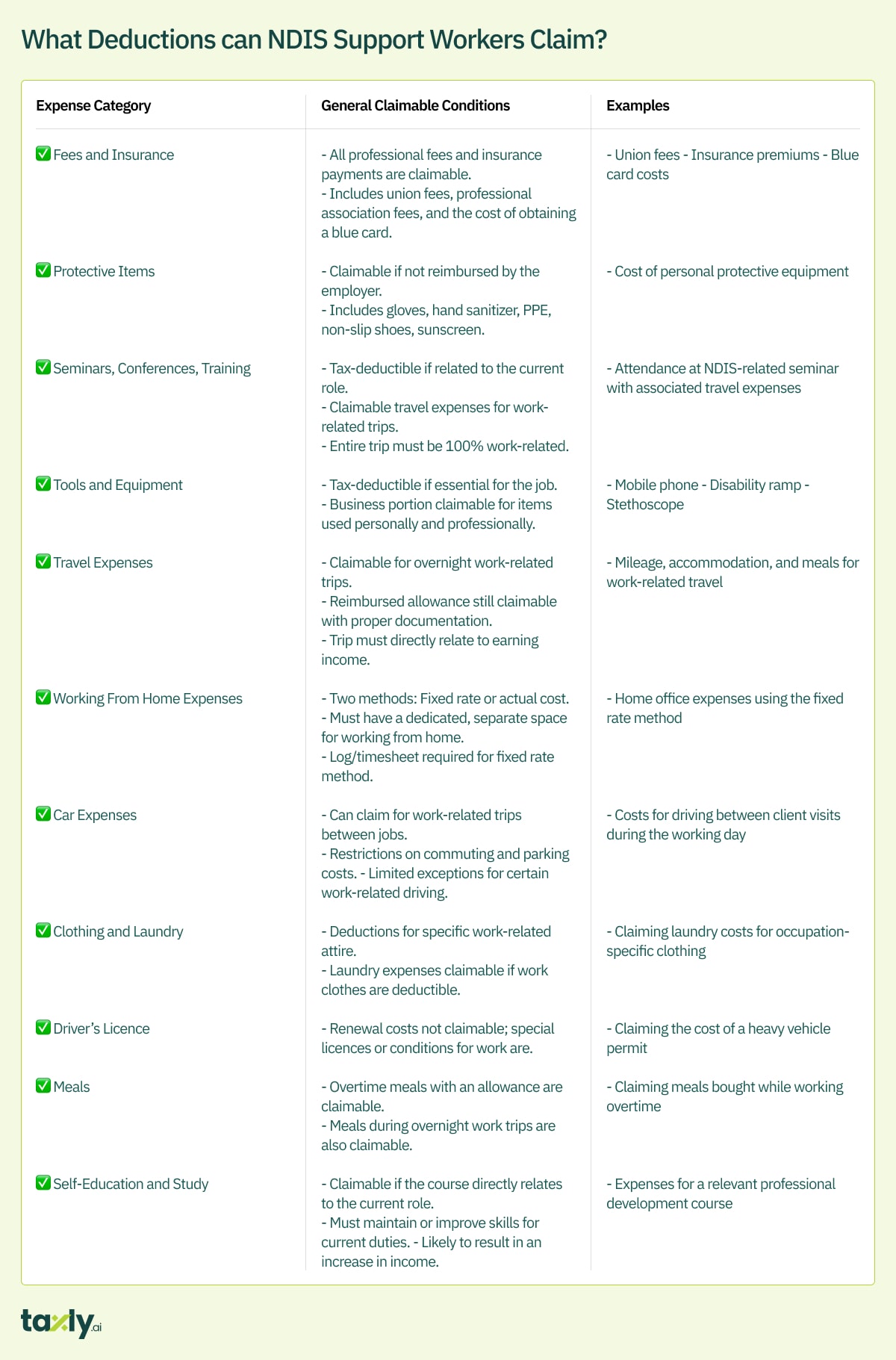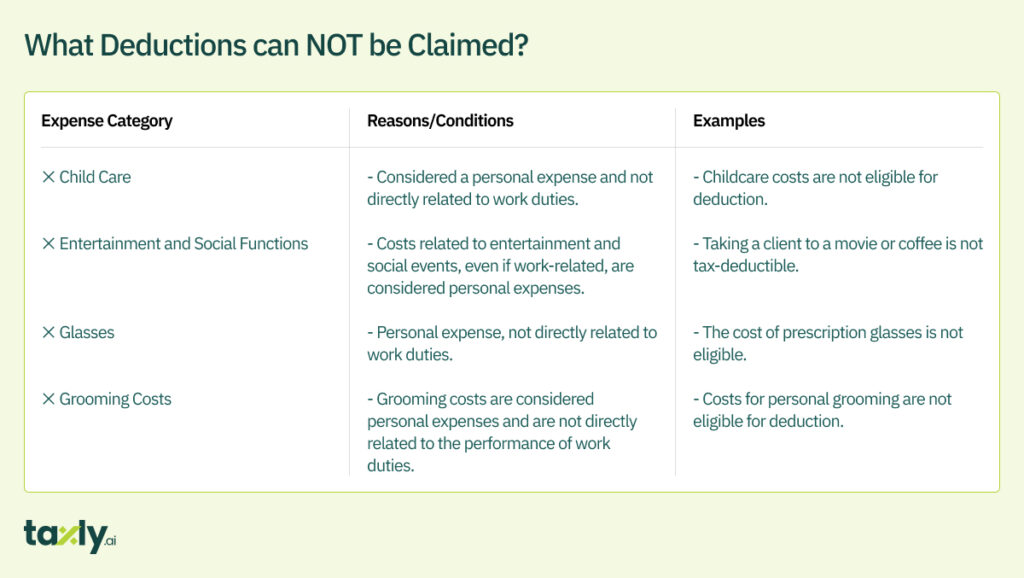Did you know that a significant percentage of sole traders, including NDIS workers, might be leaving money on the table by not optimizing their tax claims? It’s more complicated than it looks but the good news is that knowing a few key guidelines can simplify the entire process for NDIS Support worker tax return.
NDIS Support Worker Tax Return – Income Reporting
For community workers, it’s important to include all applicable income in their tax return, while also being mindful of what amounts do not need to be included. Here’s a breakdown of amounts that should be included and those that typically do not need to be included:
Income to Include in Tax Return:
- Salary and Wages:
Regular earnings received as an employee.
- Bonuses and Incentives:
Additional payments beyond regular salary for exceptional performance or meeting targets.
- Allowances:
Compensation Allowances: Payments compensating for specific work conditions or industry peculiarities.
Special Skills Allowances: Payments for having special qualifications or skills.
Expense Allowances: Amounts provided to cover work-related expenses.
- Compensation and Insurance Payments:
Payments made under an income protection insurance policy to replace salary and wages.
- Training Allowances:
Payments for attending training sessions or obtaining additional qualifications.
- Overtime Pay:
Additional compensation for working beyond regular hours.
- Gratuities or Tips (if applicable):
Cash-in-hand tips or gratuities received as part of the job.
- Uniform Allowances:
Payments to cover the cost of compulsory uniforms.
- Reimbursements for Work Expenses:
If your employer reimburses you for specific work-related expenses, include the reimbursement amount as income.
Suggested Read: Work from Home Tax Deduction In Australia: Check Your Eligibility
- Other Taxable Income:
Any other taxable income earned during the year.
Do Not Include in Tax Return:
- Reimbursements for Expenses:
If your employer reimburses you for expenses you incur (exact amounts), the reimbursement is not considered income and should not be included.
- Non-Taxable Allowances:
Some allowances may not be included on your income statement. Check your payslip. If your employer doesn’t report certain allowances, you may not need to declare them as income unless you’re claiming a deduction.
- Non-Taxable Government Payments:
Certain government payments, such as certain social security benefits, may not be taxable and may not need to be included.
- Gifts or Inheritances:
Generally, gifts and inheritances are not considered income for tax purposes.
Suggested Read: Can You Claim Gifts of Money under Donation Tax Deduction? Find Out Here
- Non-Taxable Reimbursements:
Reimbursements for specific expenses you incur, where the payment is not more than your actual expenses.
It’s crucial to carefully review income statements, payment summaries, and relevant tax documents provided by your employer. If you’re uncertain about specific amounts, seek advice from a tax professional who can provide guidance tailored to your individual circumstances and the latest tax regulations. Keeping detailed records of income and expenses is essential for accurate reporting and potential deduction claims.
NDIS Support Worker Tax Return – Allowances
An allowance is typically a specific amount of money granted or provided on a regular basis for a particular purpose. The conditions that must be met for something to be called an allowance can vary, but generally, the following criteria are considered:
- Regular Payment:
An allowance is usually provided on a regular and predictable basis. It could be a weekly, monthly, or periodic payment.
- Purpose-Specific:
Allowances are often designated for a specific purpose, such as covering work-related expenses, compensating for specific conditions, or acknowledging special skills or qualifications.
- Employer Authorization:
The allowance is typically authorized and provided by an employer or another entity responsible for compensation.
- Not Part of Regular Salary:
An allowance is distinct from regular salary or wages. It’s an additional amount provided for a specific reason.
- Reported Separately:
Allowances are often reported separately on income statements or payment summaries. Employers may provide details about different types of allowances given to employees.
- Tax Treatment:
Allowances may have specific tax implications. Some allowances are considered taxable income and must be reported on tax returns, while others may be non-taxable or subject to specific tax rules.
- Conditional on Meeting Criteria:
Some allowances may be contingent on meeting certain criteria or conditions. For example, a travel allowance may be provided only if the employee is required to travel for work.
- Agreement or Policy:
The conditions for receiving an allowance may be outlined in an employment agreement, company policy, or industry standards.
Examples of allowances include travel allowances, uniform allowances, meal allowances, housing allowances, and special skills allowances. It’s important for both employers and employees to have clarity on the purpose, conditions, and tax treatment of allowances to ensure accurate financial reporting and compliance with regulations.
Keep in mind that specific regulations and definitions of allowances can vary by country and jurisdiction. Individuals should refer to the applicable laws and guidelines in their region or seek advice from financial professionals for specific information relevant to their situation.
When reporting allowances in your tax return, it’s crucial to follow the guidelines provided by your employer and tax authorities. If in doubt, consider seeking advice from a tax professional who can provide personalized guidance based on your specific situation and the latest tax regulations.
When to Include Allowances and When not to Include them?
If you spend the allowance amount on work expenses:
- You do not include it as income in your tax return.
- You cannot claim any deductions for the work expenses the allowance covers.
- If you’re not claiming a deduction, you don’t need to keep any records of the amounts you spend.
However, if you spend your allowance on work expenses and wish to claim a deduction:
- Include the allowance as income in your tax return.
- You can claim the work expenses you incur.
- You must have records of your expenses.
- The amount of the deduction is not usually the same as the allowance you have received.
NDIS Support Worker Allowance Types and Applicable Deductions

Reimbursements:
When your employer provides you with the exact amount to cover expenses, either before or after you incur them, it is considered a reimbursement, not an allowance.
A reimbursement differs from an allowance.
If your employer reimburses you for expenses:
- You do not need to include the reimbursement as income in your tax return.
- You cannot claim a deduction for the expenses covered by the reimbursement.
NDIS Support Worker Tax Deductions on Expenses
Understanding which expenses you can and cannot claim as deductions for earning your income or performing your work is crucial. Here are the key guidelines:
Golden Rules for Claiming Deductions:
- You must have personally spent the money, and no reimbursement should have been received.
- The expense must directly relate to the process of earning your income.
- Maintain a record as evidence of the expense, typically in the form of a receipt.
Expense Allocation for Mixed Use:
If an expense serves both work and private purposes, you can only claim a deduction for the portion directly related to work.
Non-Claimable Scenarios:
- Deductions cannot be claimed if you fail to keep records of your work-related expenses.
- If someone else, such as your employer, covers the expense or reimburses you, you are not eligible to claim a deduction.
Who is a “Direct Carer”?
When we refer to a “direct carer,” we mean an employee engaged in hands-on care for individuals who are elderly, ill, or disabled. This can include providing care in clients’ homes or community-based care in assisted living facilities.
What Deductions can NDIS Support Workers Claim?

What Deductions can NOT be Claimed?

Which Conditions must be Met to Claim NDIS Support Worker Tax Deductions?
To claim deductions for work-related expenses as an NDIS worker, you must meet certain conditions and keep specific records. Here is a list of conditions to meet and records to keep:
Conditions to Meet:
- You must have spent the money, and you weren’t reimbursed: You can only claim expenses that you paid for and were not reimbursed by your employer or any other entity.
- The expense must directly relate to earning your income: The expense should be incurred as part of your work duties, and there should be a direct connection between the expense and your ability to earn income.
- You must have a record to prove it: Keep detailed records of your work-related expenses, including receipts, invoices, or other documentation that supports your claim.
- The expense should be incurred for work purposes: Ensure that the expense was necessary and directly related to your job, not for personal use or enjoyment.
- You can only claim the work-related portion: If an expense is for both work and private purposes, you can only claim a deduction for the work-related portion.
- You can’t claim expenses if someone else pays for them or reimburses you: If your employer or any other entity covers the expense or reimburses you, you generally can’t claim it as a deduction.
How to Keep Records for Claiming NDIS Support Worker Tax Deductions?
- Receipts and Invoices: Keep original receipts or invoices for all expenses you want to claim. These documents should provide details of the expense, including the date, amount, and nature of the expense.
- Payment Records: If you make payments by electronic means (credit card, bank transfer), keep records of these transactions as proof of payment.
- Travel Records: For travel-related expenses, keep a logbook or travel diary that details each trip’s purpose, dates, mileage, and related expenses.
- Work Diaries or Timesheets: If claiming expenses related to working from home or overtime, maintain work diaries or timesheets that show the hours worked and the nature of the work.
- Documentation for Allowances: If you receive allowances that are included in your assessable income, keep records of the allowances received and any documentation supporting the claim.
- Records of Work-Related Education: If claiming self-education expenses, keep records of the courses, seminars, or training attended, along with receipts and proof of payment.
- Home Office Records: If claiming expenses for working from home, maintain records of home office expenses, such as utility bills, and the calculation method used (fixed rate or actual cost).
Claim NDIS Support Worker Tax Deductions with Taxly.Ai
Streamline your tax filing process with Taxly.ai, the intelligent tax app designed for NDIS Support Workers. Say goodbye to tedious paperwork and manual calculations. Taxly.ai automates the process by effortlessly scanning your expenses and identifying all eligible deductions for you. Maximize your tax refund without the hassle—try Taxly.ai today and experience the future of stress-free tax filing for NDIS Support Workers!


Comments are closed